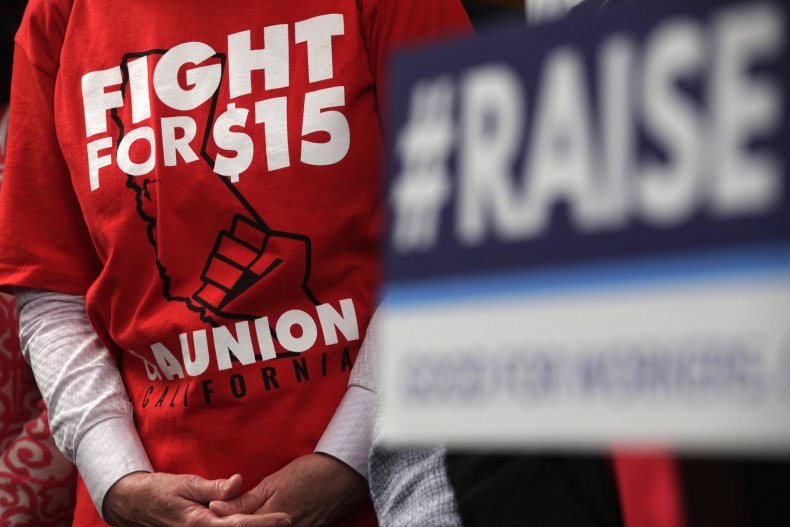[ad_1]
Vice President Kamala Harris won’t overrule the Senate parliamentarian’s ruling on excluding the $15 minimum wage proposal from a budget reconciliation vote, but the Biden administration is committed to making good on the campaign promise, which may mean killing the Senate filibuster.
On Friday, the House of Representatives is likely to pass a $1.9 trillion relief package that would increase the minimum wage to $15 in 2025. While Democrats hoped to pass the package in the Senate with a simple majority vote by way of budget reconciliation, the Senate parliamentarian advised that minimum wage violated the Byrd Rule, which restricts what can be included in reconciliation legislation. That puts Democrats in a position where they need Republican support they likely don’t have.
Without the reconciliation process, the Democratic caucus would need 10 Republican senators on board to get the 60 votes needed to overcome a filibuster and move the package to a floor vote. The parliamentarian’s ruling reignited calls for Democrats to kill the filibuster, a possibility that director of the National Economic Council Brian Deese doesn’t rule out.
Asked whether President Joe Biden was considering ending the filibuster as way to pass the minimum wage proposal, Deese told MSNBC’s Morning Joe the White House would meet with congressional leaders to find the “best path forward.”
“We are resolved to move forward, and we’re going to have those conversations and figure out the best way to do that while at the same time making progress on the American Rescue Plan,” Deese said.

Alex Wong/Getty
Democrats likely won’t be able to actually eliminate the filibuster, as a formal change to Rule 22 would require two-thirds support in the Senate and Republicans won’t go for that. But they could invoke what’s commonly referred to as the “nuclear option,” where a new Senate precedent is created.
In 2013, former Democratic Senate Majority Leader Harry Reid used the nuclear option to end filibusters for most presidential nominations. It was then used in 2017 and 2018 when Republicans ended filibusters for the Supreme Court nominations of Neil Gorsuch and Brett Kavanaugh.
Newsweek reached out to Senate Majority Leader Chuck Schumer for comment but did not receive a response in time for publication.
During the presidential campaign, Biden called for a nationwide $15 minimum wage, and the current plan would make incremental increases over the next four years. The most immediate raise, which would come on the first day of the third month after its passage, would be to $9.60, followed by $11 per hour in 2022. The minimum wage would then increase to $12.50 in 2023 and $14 in 2024, with the full $15 beginning in 2025.
While the proposal has garnered large support from Democrats, many Republicans oppose it for being detrimental to small businesses. They’ve offered two different proposals of their own, one from Senators Tom Cotton and Mitt Romney and another from Senator Josh Hawley.
Romney and Cotton’s proposal would implement a $10 minimum wage over four years, with a slower phased approach for small businesses. The legislation is a way to “raise the floor for workers without costing jobs,” Romney said.
Instead of raising the minimum wage, Hawley proposes a tax credit for people who make less than $16.50 an hour. A full-time worker could be eligible for up to $4,680 in tax credits a year, according to the proposal, and Hawley said it would deliver “meaningful relief” for working Americans “while incentivizing and promoting work.”
Democrats have rejected the plans for not meeting the needs of Americans, and Deese called Biden’s plan an “urgently needed step forward.”
He added that the administration was “disappointed” by the parliamentarian’s ruling, which could be overruled by Harris. Some have urged her to take action to allow the minimum wage plan to be passed by way of budget reconciliation, but Deese took that option off the table, saying that the White House respects the Senate process and Harris would not be intervening.
The White House remains “absolutely” committed to passing the $15 minimum wage plan, Deese said, and will meet with congressional allies on Friday to find a way to make it a reality.
[ad_2]
Source link